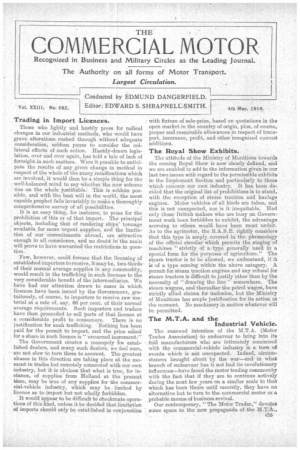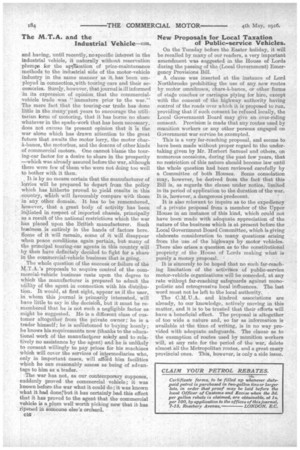Trading in Import Licences.
Page 1

Page 2

If you've noticed an error in this article please click here to report it so we can fix it.
Those who lightly and hastily press for radical changes in our, industrial methods, who would have grave alterations rushed through without adequate consideration, seldom pause to consider the collateral effects of such action. Hastily-drawn legislation, over and over again, has told a tale of lack of foresight in such matters. Were it possible to anticipate the results of any, given change in method in respect of the whole of the many ramifications which , are involved, it would then be a simple thing for the well-balanced mind to say whether the new scheme was on the whole justifiable: This is seldom possible, and with the best will in the world, the most capable prophet fails invariably to make a thoroughly comprehensive survey of all possibilities.
It is an easy thing, for instance, to press for the_ prohibition of this or of that import. The principal objects, including that of rendering ships' tonnage available,for more urgent supplies, and the linaitation of our commitments abroad, are attractive enough in all conscience, and no doubt in the main will prove to have warranted the restrictions in question.
Few, however, could foresee that the licensing of established importers to receive, it may be, two-thirds of their normal average supplies in any commodity, would result in the trafficking in such licences to the very considerable benefit of the intermediaries. We have had our attention drawn to cases in which licences have been issued by the Government, gratuitously, of course, to importers to receive raw material at a rate of, say, 66 per cent. of their normal average requirements. Such importers and traders have then proceeded to sell parts of that licence at a considerable profit to consumers. There is no justification for such trafficking. Nothing has been paid for the permit to import, and the price asked for a share in such licence is " unearned increment:" The Government creates a monopoly for established dealers, and many such dealers, we feel sure, are not slow to turn them to ,account. The greatest abuses in this direction are taking place at the moment in trades but remotely connected with our own industry, but it is obvious that what is true, for instance, of supplies from Holland at the present time, may be true of any supplies for the commercial-vehicle industry, which may be limited by licence as to import but not wholly forbidden. It would appear to be difficult to checkmate operations of this kind, unless it be decided that limitation of imports should only be established in conjunction with fixture of sale-price, based on quotations in the open market in the country of origin, plus, of course, proper and reasonable allowances in respect of transport, insurance, profit, and other 'recognized current additions.
The Royal Show Exhibits.
The attitude of the Ministry of Munitions towards the coming Royal Show is now' clearly defined, and we are enabled to add to the information given in our last two issues with regard to the permissible exhibits in the Implement Section and particularly to those which concern our own industry. It has been decided that the original list of prohibitions is to stand, with the exception of steam traction and haulage engines. Motor vehicles of all kinds are taboo, and this is not unexpected, nor is it inequitable. Had only those British makers who are busy on Government work been forbidden to exhibit, the advantage accruing to others would have been most -unfair. As to the agrimotor, the BASE. rightly considers that this type is amply covered in the phraseology of the official circular which permits the staging of machines "strictly of a type generally used in a special form for the purposes of agriculture." The steam tractor is to be allowed, we understand, if it is of a type coming within the above category. A permit for steam traction engines and any refusal for steam tractors is difficult to justify other than by the necessity of "drawing the line" somewhere. The steam wagons, and thereafter the petrol wagon, have strictly allied claims for inclusion, but the Ministry of Munitions has ample justification for its action at the moment. No machinery in motion whatever will b-e permitted.
The M.T.A. and the
Industrial Vehicle.
The renewed intention of the M.T.A. (Motor Trades Association) to endeavour to bring into its , fold manufacturers who are intimately concerned with the commercial-vehicle industry is a turn of events which is not unexpected. Indeed, circumstances brought about by the war—and in what branch of endeavour has it not had its revolutionary influences—have faced the motor trading community with the fact that if they are to continue actively during the next few years on a similar scale to that which has been theirs until recently, they have no alternative but to turn to the cornmercial motor as a probable means of business revival. Our contemporary, "The Motor Trader," devotes same space to the new propaganda of the M.T:A., 615 and having, until recently, no specific interest in the industrial vehicle, it naturally without reservation 'plumps kr the apflication of price-maintenance methods to the industrial side of the motor-vehicle industry in the same manner. as it. has been employed in connection,with touring cars and their accessories. Surely, however, that journal is ill informed in its expression of opinion that the commercialvehicle trade was " immature prior to the war." The mere fact that the touring-car trade has done little in the many. past years to encourage the utilitarian form of motoring, that it has borne no share whatever in the spade-work that has been necessary, does not excuse its present opinion that it Is the war alone which has drawn attention to the great future that awaits the motor lorry, the motor chara-bancs, the motorbus, and the dozens of other kinds of commercial motors. One cannot Warne the touring-car factor for a desire to share in the prosperity —which was already assured before the war, although there were few of them who were not doing too well • to bother with it then.
. It is by no means certain that the manufacturer of lorries will be prepared to depart from the policy which has hitherto proved to yield results in this country, which will favourably compare with those in any other domain. It has to be remembered, however, that a great body of activity has been inttiated in respect of imported chassis, principally as a result of the national restrictions which the war has placed upon the 13ritish manufacturer. Such business is entirely in the hands of factors here. Some of it will remain, some of it will disappear when peace conditions again pertain, but many of the principal touring-car agents in this country will by then have definitely decided to fight for a share in the commercial-vehicle business that is going. The whole question of the success or failure of the M.T.A.'s proposals to acquire control of the commercial-vehicle business rests upon the degree to which the manufacturer is prepared to admit the utility Of the agent in connection with his distribution. It would, at first sight, appear as if the user, in whom this journal is primarily interested, will have little to say in the clecisia, but it must be remembered that he is not such a negligible factor as might be suggested. He is a different class of customer altogether from the private owner he is a trader himself; he is acgdstomed to buying keenly ; he knows his requirements now (thanks to the educational work of the manufacturer solely and to relatively no assistance by the agent) and he is unlikely to consent willingly to pay prices for his machines which will cover the services of intermediaries who, only in important cases, will afard. him facilities which he can reasonably assess as being of advantage to him as a trader.
The war has not, as our contemporary supposes, suddenly proved the commercial vehicle ; it was known before the war what it could do ; it was known what it had done;but it has certainly had this effect that it has proved to the agent that the commercial vehicle is a plum well worth picking now that it has ripened in someone else's orchard.
C16
New Proposals for Local Taxation of Public-service Vehicles.
On the Tuesday before the Easter holiday, it will be recalled by many of our readers, a very important amendment was suggested in the House of Lords during the passing of the (Local Government) Emergency Provisions Bill.
A. clause was inserted at the instance of Lord Northbrooke prohibiting the use of any new routes by motor omnibuses, chars-a-bancs, or other forms of stage coaches or carriages plying for hire, except with the consent of the highway authority, having control of the roads over which it is proposed to run, providing that if such consent be refused locally, the Local Government Board may give an over-riding consent. Provision is made that any routes used by munition workers or any other persons engaged on Government war service be exempted.
This is a very far-reaching proposal, and seems to have been made without proper regard to the undertaking given by Mr. Herbert Samuel and others, on numerous occasions, during the past few years, that no restriction of this nature should become law until the whole question had been reviewed carefully by a Committee of both Houses. Some consolation may, however, be derived frona the fact that this Bill is, as regards the clause under notice, limited in its period of application to the duration of the war. It is, however, a dangeroui predeeent.
It is also Teleivant to inquire as to the expediency of a private proposal from a member of the Upper House in an instance of this kind, which could not have been made with adequate appreciation of the nature of the business which is at present before the Local Government Board Committee, which is giving elaborate consideration to many questions arising from the use of the highways by motor vehicles. There also arises a question as to the constitutional propriety of the House of Lords making what is purely a money proposal.
It is sincerely to be hoped that no such far-reaching limitation of the activities of public-service motor-vehicle organizations will be conceded, at any rate without fax-reaching safeguards against mono polistic and e local influences. The last word must not be left to the local authority. .
The C.M.TJ.A. and kindred associations are already, to our knowledge, actively moving in this matter, and it is to be trusted that their efforts will have la beneficial effect. The proposal is altogether of too wide a nature and, so far as information is available at -the time of writing, is in no way provided with adequate safeguards. The clause as to the exemption of routes used by munition workers will, at any rate for the period of the war, delete almost all the Metropolitan routes, and a great many provincial ones. This, however, is only a side issue.




















